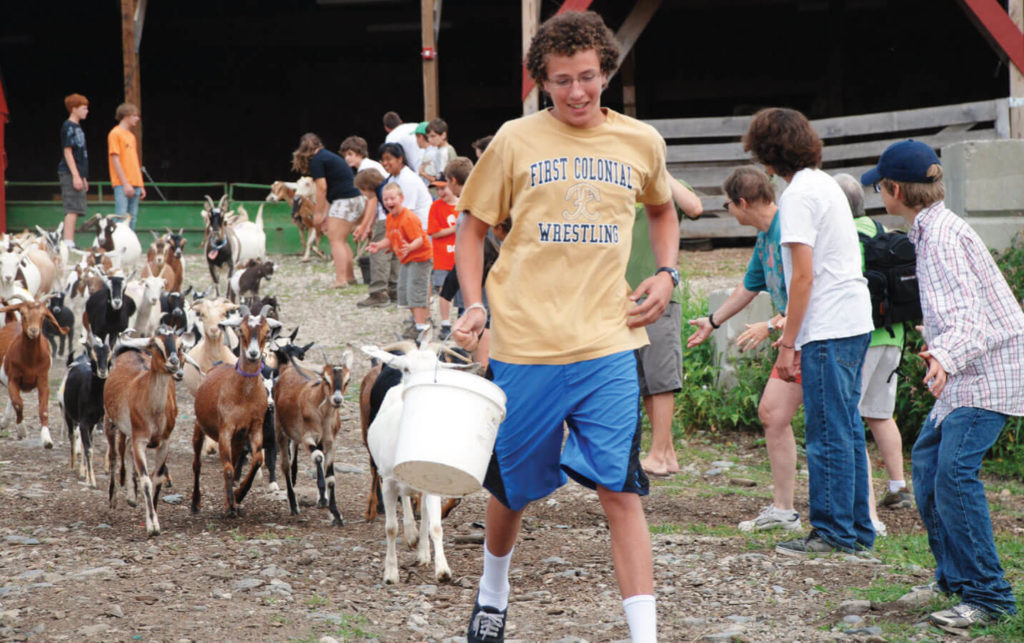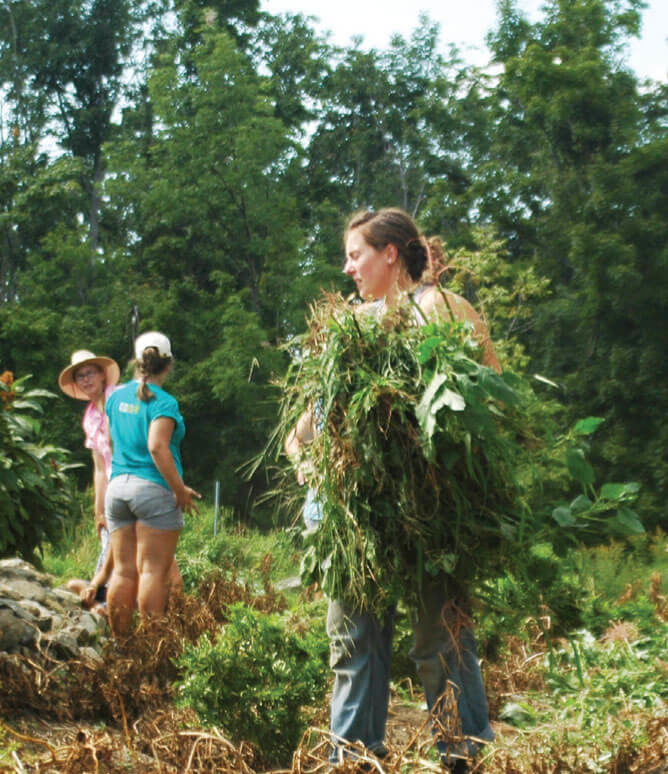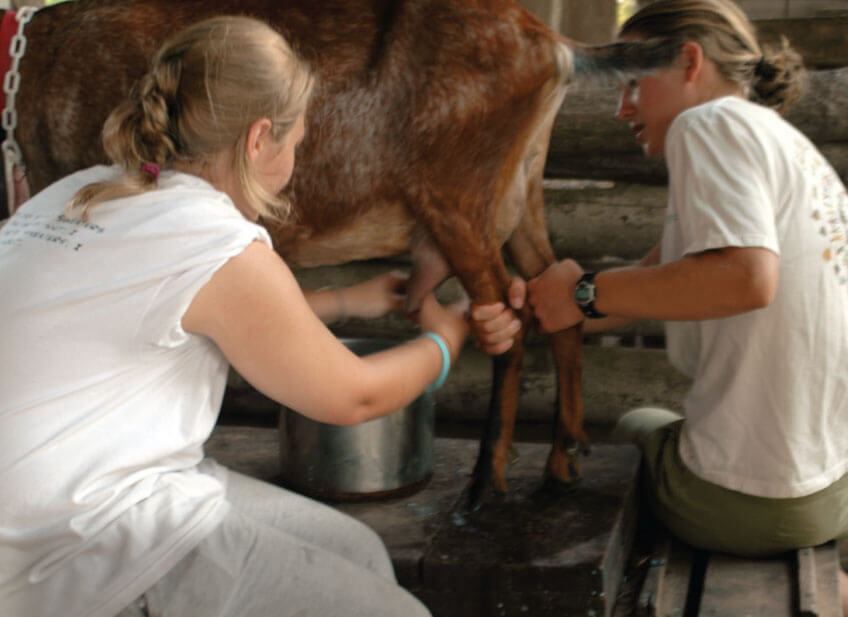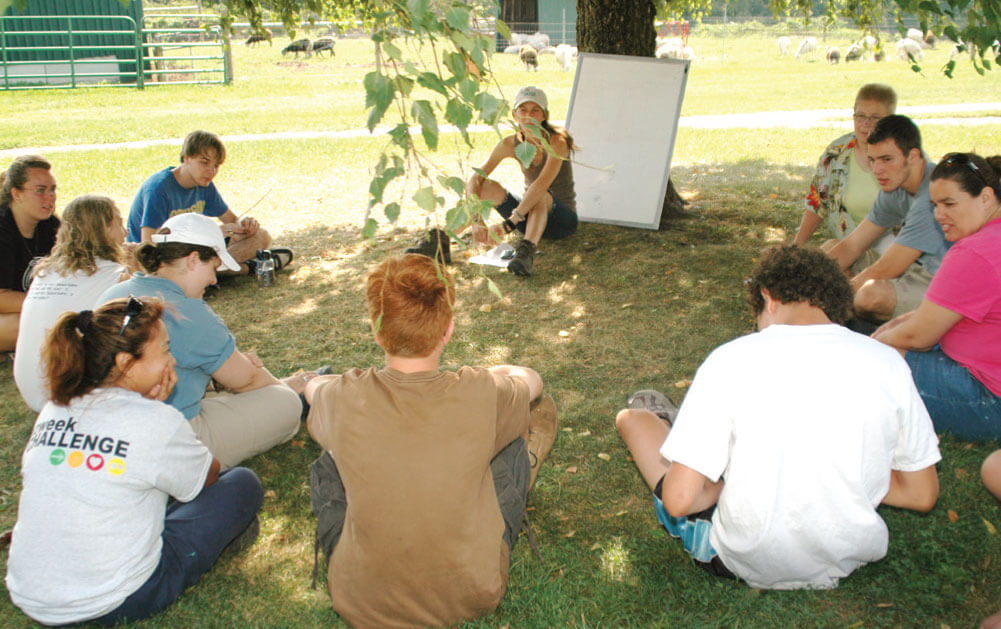by Joan Mitchell, CSJ
Young people can feed livestock and weed gardens at Overlook Farm, Heifer International’s learning center in Massachusetts. The farm seeks to inspire its visitors to help end hunger and poverty and to care for the earth. Heifer International provides training in sustainable agriculture and gives livestock — cows, goats, rabbits, chickens — to people all over the world who are poor.
The teens from Covenant Christian Presbyterian Church in Virginia Beach, Virginia, raised money to spend four days at Overlook Farm, helping with farm work and experiencing how people who are poor live. Their overnight in the Global Village climaxed their visit.
A lottery determines by chance where groups stay in the Global Village. “None of us chooses where we are born,” explains one of the teens.
The Virginia group draws three sites — Ghana, Appalachia, and Guatemala. They could have drawn a Tibetan yurt, a Thai house on stilts, or the comfortable log house like many in Poland. Each house replicates basic family living quarters in a country or region. Each house contains clothes from the country that teens can wear.
A program script describes each family and country, their income, literacy levels. The script directs the teens to take roles — head of household, mother, child, an injured or handicapped person — as they make a fire, buy food at the market, make dinner, and do listed chores.
Groups each have play money to use at the market. After dinner each family discusses a scenario that describes a critical problem the family faces.
Several young adults serve at Overlook as counselors. Some are veterinary students who want to work with animals, some are considering Peace Corps, some want to learn gardening, some want to have their own farms.
Counselor Rebecca Blakeslee discovered Heifer International in doing Heifer’s Read to Feed program in grade school. She loves Heifer’s mission to end hunger and poverty and care for the earth. Her interest in sustainable agriculture brings her to Overlook after studying in Bolivia.
The teens gather with Rebecca after their Global Village overnight to debrief — Jamie, Dave, Aisha, Hunter, Vicki, Elizabeth, Zeina, Emily, Zane. The Appalachian family reports that they made a great stew for dinner. They found wood, made a fire, made their stew, and were the first of the groups to eat dinner. Their head of household traded for carrots, green onion, tomatoes, potatoes, beans, salt, pepper, and ginger at the market. For breakfast they mixed leftover stew with oatmeal.
The teens that lived as the Baidu family of Ghana bartered services for produce when they couldn’t buy all they needed. They got two tomatoes, rice, beans, and scallions. They traded pepper for rice and shared hospitality with the Appalachians.
Finding matches to light the fire took an hour and a half, the head of the Ghana household reports. Then they put too much water in the flour, so they had pudding rather than bread. They threw the veggies on top of the scallions and tomatoes, which burned.
“It was gross. It tasted like sawdust,” says one.
“I was hungry afterwards,” adds another.
In their simulation the Ghana group experienced the birth of a new baby after dinner. “We went to bed at 8:30 — five people, three beds,” they report, so they woke up early, cooked oatmeal, cleaned, and packed their gear. One of the boys carries the new baby, a water balloon.
The Guatemala family had only a few tomatoes and onions until they bartered services, such as watering the pigs, and got more tomatoes, scallions, carrots, and flour. Their group made burritos. They could see the garden from their house, which tempted them to raid for more vegetables.
Guatemala stayed up talking until eleven, shining a light to look for spiders and worrying about the sounds a nearby water buffalo made. A cat scared them in the night. They woke up early, made a fire, cooked breakfast, and fed and milked their goats.
The young people had many comments about the overnight.
“It was hard but I wanted it to be harder.”
“I’d like to stay more than one night.”
“We stayed one night; people live like this their whole lives.”
“People in these countries must be better than we are at basic skills like building fires, cooking, cleaning house.”
“It was icky being filthy, going to bed with no bath, no way to brush my teeth.”
For the next step in their four days at Overlook, the Virginia group gathered under a tree to discuss their solutions to the problem scenarios. Families presented their problems and solutions on white boards to the whole circle. Then they simulated writing grants, requesting Heifer aid for their families.
The Guatemala family can’t make a living growing coffee. When they sell beans for export, they receive 50 cents a pound. Producing a pound of beans costs $1. What are their options?
The family can keep growing coffee and hope for a better market. Or, they can plant and grow citrus. They will have to protect themselves from rebels that raid the villages and mark families that stop growing coffee and seek a better life. Or, the family can split up and send the dad and older children to the city to earn money, perhaps in a sweatshop.
For the Ghana family access to education is the issue. The village school is poor and has few grades. The local Catholic school costs more money than the family has. They could send one child at a time to the private school.
In Appalachia the family struggles to keep a daughter who is top in her class from dropping out of school so she can go to work. The dad is off work because of a strike; the mother is able to work.
What should each family do? How might Heifer help?
On the last morning Rebecca asks, “What were your aha moments and your low point in your four days here?”
“Stealing the food left in the market was a low point,” said one adult. “My high point came every morning out on the hills.”
“The food was left out deliberately; that was okay,” says Rebecca.
“I went to the shower and thought people don’t get to do this.”
“My high point was working with livestock.”
“No lows. My aha moments were getting up early, going outside, just soaking in nature, the animals.”
“The market was my high point, watching Kyle and Aisha bargain.”
“My high was the whole week — cooking, hanging out, doing everything together. My low was trying to cook and do dishes with one hand because I was handicapped in my role.”
“My aha in the global village was realizing how much work people put in to live every day and how much talent they have to do it.”
“My low was weeding the entire garden yesterday.”
“I had my aha moment when I wondered how people live on just vegetables for such long periods of time.”
Heifer has a tradition of giving from what one receives. Families who receive a goat give its first offspring to another family. Rebecca asks the Virginia Beach group what they will take home and give from what they received.
“Tell people what Heifer is all about.”
“Get people to support Heifer.”
“Get others involved at school.”
“Buy food from farmers’ markets.”
“Plant a garden.”
“Help out local food pantries.”





